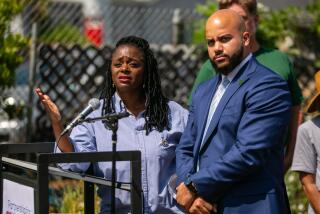Anti-Voucher Campaign Airs First TV Ads
- Share via
SACRAMENTO — Opponents of the school voucher initiative Tuesday unveiled their first television commercials blasting the measure and vowed to spend what it takes to stay on the airwaves until the November election.
The two commercials come six weeks before the Nov. 2 election and underscore the opposition’s deep pockets. The ads are going unanswered on the air by the campaign in favor of Proposition 174, which is operating with far less money.
The televised broadsides, scheduled to air across California, home in on what the opponents see as the initiative’s flaws, focusing on its cost and lack of controls on who could open a voucher-redeeming school.
At news conferences in Sacramento, Los Angeles and San Francisco, campaign managers for the anti-voucher campaign previewed the television advertisements and introduced parents involved in the PTA to speak out against the measure.
Proposition 174 would give parents tax-supported vouchers worth $2,600 to help send their child to any school that would accept them, including private and parochial schools. The money would come from the public schools’ budget.
“You’d better read the fine print,” says one of the commercials, read by a parent active in the PTA in Davis. “Under Proposition 174, anyone can open a voucher school. All they need is 25 students. That’s it. No credentials required for teachers. No need to teach real courses in math, science or reading. And no public disclosure.”
The second commercial shows a light bulb: “Here’s a bright idea. Let’s allow anyone who can round up 25 kids to open a voucher school. We’ll pass out a billion dollars to pay for it. We’ll let them hire anyone as a teacher, no credentials or experience required.”
In the voter pamphlet to be mailed to all registered voters, the legislative analyst says the initiative would have a net cost initially of hundreds of millions of dollars a year. That analysis also assumes that as students leave public schools, there will be some savings to the state.
Bob Nelson of the anti-voucher campaign’s consulting firm, Nelson & Lucas Communications, explained the $1 billion estimate by pointing out that if Proposition 174 becomes law, the 550,000 children currently enrolled in private schools could qualify for the vouchers.
“Our strategy is very simple: Read the fine print. When voters get their pamphlet, open it up, read the independent fiscal analysis,” Nelson said, calling the initiative the “most shabby” legislation ever proposed affecting the children of California.
At a Sacramento news conference called to respond to the TV attacks, John Nelson, a Yes on 174 spokesman, affirmed a central point of the spots: The initiative does not allow for public inspection or routine government audits of the financial records of a private school that receives the tax-funded vouchers.
However, he noted, if private school parents were denied access to the books, “the parents could leave” the school.
“We can have control under this initiative,” John Nelson said. “The Legislature can certainly pass a law saying you have to teach this, that and the other thing.”
Any change in the initiative would require a three-fourths vote of the Legislature. The highly partisan California Assembly rarely produces a three-fourths vote on any measure with a hint of controversy.
Bob Nelson would not reveal the cost of the television campaign, but has said the No on 174 group could spend $10 million to try to defeat the initiative, twice what the pro-voucher campaign hopes to spend.
The effort to defeat the initiative is being funded almost exclusively by unions representing public school teachers and other employees, whereas the proponents are backed primarily by Christian fundamentalists, libertarians and free-market conservatives.
More to Read
Sign up for Essential California
The most important California stories and recommendations in your inbox every morning.
You may occasionally receive promotional content from the Los Angeles Times.










